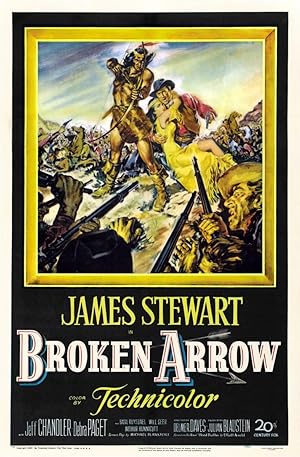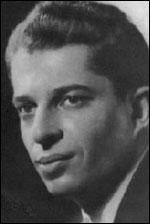
Broken Arrow Page #5
- APPROVED
- Year:
- 1950
- 93 min
- 562 Views
It is a terrible wrong.
It cannot be allowed.
Nothing's changed.
Go to Tucson.
Return in ten days.
I ask you to forgive me that one
of my people broke my word.
Nahilzay.
In battle I have had no one like you.
It is ended. You have
betrayed our people.
I went back to Tucson and
studied General Howard.
Before our return I learned to
respect the Christian General.
would come from this.
I wanted it for my country...
...for Cochise and his people...
...and I wanted it because
I loved a girl.
I am told it is permitted to visit.
For a short time only.
My mother is inside the wickiup.
You will sit there...
...and I will keep sitting here...
...for we must not even
touch our hands.
During the days I...
...I am very busy now. I prepare
my clothes for the wedding.
I must build a special wickiup
for our honeymoon...
...away from everybody.
Our honeymoon, Tom!
I must also build the wickiup
we will live in.
In all this my mother
helps me and teaches me...
...and I try to do as I...
...I think she did when
she was a girl.
And she couldn't have done it neater.
What is that? What does it mean?
That's something Americans say.
It means that I love you and
I'll honor your parents.
You understand, Cochise,
about the signing of this map.
I will place my name upon yours...
...you will place
your mark upon mine.
What is this signing?
This is proof for all people of
any agreement that is made.
It is as we agreed yesterday.
You will explain it to the others.
The peace conference had been
going on for four days...
...and we were asked to approach
the meeting place.
We finally met the most important
men of the Apache tribes.
They had come from Arizona
and New Mexico...
...they would decide with Cochise
My white brother
will tell you something.
I have in my hand here a map.
This is a sort of picture writing.
It shows the Apache territory,
fifty thousand square miles...
...that you have agreed upon.
This map will go back
to Washington...
...were the Chief of all
the white men lives.
If you make a treaty of peace...
...this will be part of that treaty.
If we make peace with
the Americans...
...can we still raid the Mexicans?
There cannot be war against
the Mexicans either.
Let the white eyes...
Wait. We will talk of
this by ourselves.
Now is the time only for questions.
dies, what will follow?
His word is a bond on
Do others wish to speak?
I have a question.
Suppose some white man wants
yellow iron and he comes into our land.
Can we kill him?
given to our military.
Then he will be judged and punished.
What if he resists capture until
he has killed one of my men?
If a white man kills an Indian on
your territory we will hung him.
That will be something
for Cochise to see.
Who else?
You will go now.
I will bring you our decision.
I trust none of it.
Four days ago we were given
our territory on a piece of paper.
Today we cannot go into Mexico.
The American General says no.
Already our territory is smaller.
Where will we get horses if not by
taking them from the Mexican?
The government will give us cattle.
The answer of a woman.
I am not afraid.
I speak from my heart.
You speak well.
Speak more.
Apaches are not
grandmothers to cattle.
is ready to surrender.
It is not this false peace
we need but a new chief.
Now I say this.
they are not soft or weak.
Why should not the Apache
be able to learn new ways?
It is not easy to change but
sometimes it is required.
The Americans are growing stronger...
...while we are growing weaker.
If a big wind comes,
a tree must bend...
...or be lifted out by its roots.
I will make a test of
it for three moons.
I break the arrow.
I will try the way of peace.
I will give my word to the
American General tonight.
Those who stay with me
must keep my word.
Let all others walk away.
They are no longer my brothers.
If more walk away than stay...
...then I will no longer
be your chief.
I walk away.
I walk away.
I walk away.
I walk away.
I walk away.
I walk away.
Who else comes?
Who else comes?
Who else?
Take your women, your children...
...your horses, your weapons.
Leave our territory.
I leave you my name also.
Now I am ashamed to be a Chiricahua.
I will take the name Mexican
enemies have given me.
...and you will learn it.
From now on...
...I am Geronimo!
If Geronimo or his followers come
to this territory again...
...let them come with weapons.
I am worried.
They're taking a long time...
...too long.
I am worried too.
This is delicious. What is it?
Pony. In you honor, General.
Pony? What kind of meat's that?
A pony is a small horse, General.
We will try this peace.
But there must be a waiting time...
...a time for testing. Three moons.
Why is it needed?
The white man has not kept
a peace in the past.
- It's a good idea.
The first stone.
there will be another.
When 3 moons have passed,
the pile will be high.
Then we will place a white flag
on it and there will be peace.
My heart is glad, Cochise.
I am not yet glad.
To talk a peace is not hard.
To live it is very hard.
I will wait three moons to be glad.
Not everyone was happy
about the treaty.
was a liar and a murderer...
...and peace impossible
until he was dead.
But the 90 days of
the armistice began.
I saw things that never
happened before.
Near Fort Grant...
...a cavalry patrol passed
some Apaches.
They didn't talk...
...they didn't pretend
they'd become friends.
But they didn't shoot.
Two days later the first coach
in five years left Tucson.
I rode with it on my way
back to the Stronghold.
Where's that water
you said we came to?
Right down below.
Time to stretch, gents.
I can believe a fellow
can ride here...
...with his liver not turned white.
Yeah. A fellow can even think about
settling down and getting married.
Take cover!
What are you shooting at?
I saw something move.
Save your ammunition!
Blast you and that murdering Cochise
both. We'll be slaughtered.
Shut up!
Keep down under cover, everybody!
Now listen to me.
This isn't Cochise.
It's a band of renegade Indians.
There're a few of them
or they'd be rushing us.
What they want is our guns.
Well, we're pinned here.
They're waiting for night.
So what do we do?
Wait to be butchered in the dark?
Shut up!
Who's a good shot?
I'm not bad. Here.
When I yell, you and this fellow
start firing into the hill.
Lonergan, you cover the bank.
I'm coming upstream.
- What do you do?
- Send smoke signals.
All right, start shooting!
Translation
Translate and read this script in other languages:
Select another language:
- - Select -
- 简体中文 (Chinese - Simplified)
- 繁體中文 (Chinese - Traditional)
- Español (Spanish)
- Esperanto (Esperanto)
- 日本語 (Japanese)
- Português (Portuguese)
- Deutsch (German)
- العربية (Arabic)
- Français (French)
- Русский (Russian)
- ಕನ್ನಡ (Kannada)
- 한국어 (Korean)
- עברית (Hebrew)
- Gaeilge (Irish)
- Українська (Ukrainian)
- اردو (Urdu)
- Magyar (Hungarian)
- मानक हिन्दी (Hindi)
- Indonesia (Indonesian)
- Italiano (Italian)
- தமிழ் (Tamil)
- Türkçe (Turkish)
- తెలుగు (Telugu)
- ภาษาไทย (Thai)
- Tiếng Việt (Vietnamese)
- Čeština (Czech)
- Polski (Polish)
- Bahasa Indonesia (Indonesian)
- Românește (Romanian)
- Nederlands (Dutch)
- Ελληνικά (Greek)
- Latinum (Latin)
- Svenska (Swedish)
- Dansk (Danish)
- Suomi (Finnish)
- فارسی (Persian)
- ייִדיש (Yiddish)
- հայերեն (Armenian)
- Norsk (Norwegian)
- English (English)
Citation
Use the citation below to add this screenplay to your bibliography:
Style:MLAChicagoAPA
"Broken Arrow" Scripts.com. STANDS4 LLC, 2024. Web. 20 Dec. 2024. <https://www.scripts.com/script/broken_arrow_4719>.



Discuss this script with the community:
Report Comment
We're doing our best to make sure our content is useful, accurate and safe.
If by any chance you spot an inappropriate comment while navigating through our website please use this form to let us know, and we'll take care of it shortly.
Attachment
You need to be logged in to favorite.
Log In